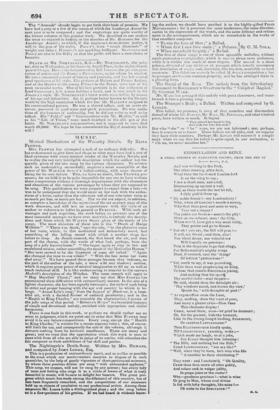r1 US1C.
Musical Illustrations of the Waverley Novels. By ELIZA FLOWER.
Miss Feowen has attempted a task of no ordinary difficulty. She has endeavoured to give form and shape to what must have bad a sort of ideal existence with every musical reader of the Waverley Novels, and to realize the not very intelligible description which the author less fre- quently given of the airs sung by the various characters. To achieve such an undertaking successfully, required a mind susceptible of the power of Sir WALTER Se ()TT'S ballad-writing, with some degree of liking for its very defects. This, we have no doubt, Miss Low en pos- sesses; for we hold it to be quite impossible for any one to have written these compositions without a thorough acquaintance with the characters and situations of the various personages by whom they are supposed to be sung. This qualification we were prepared to expect from a lady—it was to be anticipated that she would enter on her task with the enthu- siasm of a lover, rather than the reluctant toil of one who spins verse at so much per line, or music per bar. Ent we did not expect, in addition, so complete a knowledge of the mysteries of the art as every page of this work discovers, and still less an acquaintance with the style of an author so unknown to ladies in general as PURCELL. With such ad- vantages and such requisites, the work before us presents one of the most successful attemets we have ever met with, to embody the descrip- tions and hints which Sir WALTER. SCOTT gives of the music of his songs. The most elaborate of these airs is the " Death of Madge Wildfire." " There was death," says the tale, " in the plaintive tunes of her voice, which, in this moderated and melancholy mood, had something of the lulling sound with which a mother sings her infant to sleep. As Jeanie entered, she first heard the air, and then part of the chorus, with the words of what had, perhaps, been the song of a jolly harvest-home." " She began again to aing in low and modulated strains, rather resembling the music of the Methodist Hymns." "Her next seemed to be the fragment of some old ballad." " Again she changed the tune to one wilder." " With the last notes her voice died away." We have quoted these passages because they indicate, on the part of the author of the tale, a mere wild and shadowy outline, which it requires great power of musical imagination to fill up. as well as much technical skill. It is like endeavouring to transfer to the canvass Macbeth's description of the Witches. The same remark will apply to " Meg Merrilies' Chant ;" and we must say that Miss FLOWER has encountered these difficulties with extraordinary success. In the airs of a lighter character, she has been equally fortunate ; the style of each hieing in strict and proper keeping with the age mid country to which it be- longs. "Annot Lyle's song," from the Legend of Montrose, is a beau- tiful air, with a decided flavour of national peculiarity ; and in the
Health to King Charles," are traceable the characteristic features of the jolly songs of that period. "Rebecca's Hyinu" is a beautiful instance of simple and devotional melody, enriched with appropriate and skilful harmonies.
There is one fault in this work, or perhaps we should rather say an error in judgment, which we point out in order that Miss FLOWER may avoid it in any future compositions. Every song, except the " Health to King Charles," is written for a. mezzo-soprano, voice ; this of course, will limit the use, and consequently the sale of the volume, although it detracts nothing from its intrinsic excellences. These are many and treat; and we trust that the approbation which this work is sure to meet with from all who are able to judge of its merits, will stimulate the fair composer to fresh exhibitions of her skill and genius.


























 Previous page
Previous page